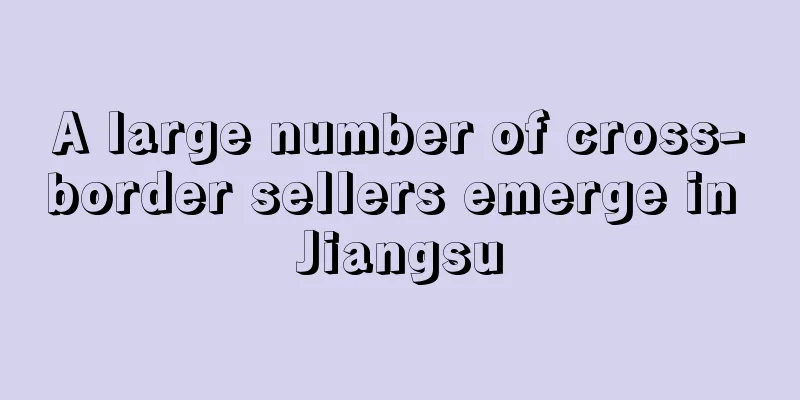Another giant has launched a new cross-border e-commerce platform!

|
eMarketer's "2022 Global E-commerce Market Forecast Report" shows that global e-commerce sales are expected to exceed US$5 trillion for the first time in 2022, accounting for 1/5 of the overall retail sales. It is expected that this figure will exceed US$7 trillion in 2025 .
The competition among domestic Internet giants for the cross-border e-commerce market share is now fierce. The two most discussed protagonists this year are Pinduoduo and ByteDance. Pinduoduo's overseas project Temu has been unstoppable since its launch in the United States in September, with downloads once exceeding Amazon. ByteDance has taken a different approach with the help of TikTok, Douyin's twin brother, relying on social e-commerce to stand out among the giants.
As one of the earliest Internet giants to go overseas, Alibaba is not far behind. After launching the fast fashion brand independent website AllyLikes last year, it has set up a new cross-border e-commerce platform this year. The latest news is that the new platform launched by Alibaba is called Miravia and will be officially launched on the 30th of this month.
APP and website have been launched, targeting middle and high-end consumers
Foreign media reported that Alibaba will launch a cross-border e-commerce platform: Miravia in Spain before the end of the year .
The news first came from Dori López Nieves, CEO of a Spanish digital marketing company . Recently, Dori López Nieves said in a LinkedIn post that she had explosive news to disclose: everything indicates that in the next few days, Alibaba will launch Miravia, a platform with a budget provided by AliExpress that includes high-quality products in fashion, beauty, electronics, and home furnishings.
It is understood that Miravia mainly provides consumers with first-class brands and mid-to-high-end products, and its target audience is consumers with high purchasing power who are looking for high-quality products. Currently, Miravia has opened eight categories: women's fashion, home and gardening, beauty and health, food and cleaning, men's fashion, leisure and free space, toys and children, and 3C electronics.
Among them, brands such as Jack&Jones and Tommy Hilfiger have entered the men's fashion category; brands such as Cecotec, Pikolin, and Rowenta have entered the home gardening category; brands such as Neutrogena and Weleda have entered the beauty and health category; brands such as Colacao, Cuetara, Lindt, and Nutella have entered the food and cleaning category; brands such as Adidas, Munich, and Salsa Jeans have entered the women's fashion category.
Miravia will be officially launched at the Mira Premiere VIP event in Madrid, Spain, on November 30. The platform is now accessible via the URL Miravia.es and the iOS app APP .
Official news shows that new Miravia users can enjoy a 20% discount on their first purchase on the platform, and orders over 10 euros will be delivered free of charge by the platform. In addition, users can enjoy a 30-day free return service, and a 3 euro discount for the first review of a product and the collection of a favorite product. There are also daily flash sales, exclusive coupons and other benefits.
Miravia is operated by Arise Operating E-Commerce Private Limited, and its address is the same as that of Lazada’s Singapore headquarters, which means it is another e-commerce project under Alibaba.
As we all know, AliExpress, which Alibaba has already deployed in the European market, mainly targets low-consumption groups, and the middle and high-consumption groups have always been blank. Miravia just fills this market gap.
It is no coincidence that Miravia chose Spain for its debut. According to European e-commerce data provided by Foxintelligence, in the first six months of this year, AliExpress was the second largest e-commerce platform in Spain , second only to Amazon, with a market share of 12.4%. Obviously, Alibaba has a certain dominance in this market. At the same time, Spain is the country where AliExpress has invested the most in the EU and has the highest GMV.
Foreign media reported that an industry source close to Alibaba told them that Alibaba has begun its operations in France to train future suppliers to develop a mid- to high-end market.
Alibaba continues to expand in Europe
Today, the US market is a competitive one. Amazon, eBay, and Walmart have deep roots in this land. Amazon, in particular, occupies an absolute dominant position. According to PYMTNS data, in 2021, Amazon's share of the US online sales market has reached 56.7%. In this case, it is difficult for new platforms to come in and share a piece of the pie.
The European market is different. Currently, no e-commerce platform has complete control over the entire market. Europe is the third largest e-commerce market in the world. Online consumption habits have been accelerated after the epidemic, and there is great potential for future explosion, which gives other "newcomers" a lot of room for development.
Therefore, for Alibaba, it is a wise decision to avoid the highly competitive US market and focus on the European market with rich accumulation.
In fact, Miravia is not Alibaba's first move in Europe this year. As early as April this year, Reuters reported that Alibaba's e-commerce platform Lazada will continue to enter the European market after its success in the Southeast Asian market.
Although Lazada has not specified which country it will enter and the time is not yet determined, Cainiao, a logistics service company under Alibaba, has already set foot in Belgium in 2020 and opened a central hub at Liege Airport in Belgium. This smart center is the largest of its kind in Europe. Foreign media speculate that this should be the central distribution location for Lazada's European sales .
At the same time, in August this year, Alibaba injected another US$912.5 million into Lazada, having already injected US$387.5 million in May, bringing the total investment since the beginning of this year to US$1.3 billion.
This move was generally interpreted by the outside world as Alibaba building momentum for Lazada's further expansion.
In fact, before Lazada and Miravia, Alibaba had been deeply involved in this market for many years through AliExpress. Through this platform, hundreds of millions of high-quality and low-priced goods were delivered to European consumers by Chinese sellers. Now it has occupied an important position in the e-commerce market of some European countries such as Spain and France.
As mentioned above, AliExpress is the second largest e-commerce platform in Spain after Amazon. Official data show that the number of Spanish sellers on the AliExpress platform increased by more than 35% in 2021. As of March this year, more than 11,000 Spanish companies have established businesses on AliExpress, most of which are small and medium-sized enterprises.
In Poland, AliExpress surpassed Amazon to become the second largest e-commerce platform in terms of market share in 2022. According to Médiamétrie, AliExpress is the sixth most visited e-commerce website in France.
According to Euromonitor, Amazon is the most popular platform in Western Europe, but its market share in the region did not grow during the pandemic, remaining at around 19.3% in 2020. In contrast, Alibaba's market share rose from 2% in 2019 to 2.9% in 2020.
It is probably this kind of growth that gives Alibaba the confidence to increase its investment in the European market.
It is also predicted that by 2025, Europe's overall e-commerce revenue will reach US$569.2 billion, exceeding the US$563.4 billion in the United States.
In conclusion : In addition to AliExpress and the international site, Alibaba has also acquired the Turkish e-commerce platform Trendyol, the Pakistani e-commerce platform Daraz, and the Singaporean e-commerce platform Lazada through investment and acquisition in recent years . Last year, when the DTC independent station brand overseas boom was set off, it launched the fast fashion e-commerce brand allyLikes. It has gradually expanded its e-commerce footprint to the world and penetrated its business into various sectors and consumer groups.
Alibaba's third quarter financial report this year showed that in the international sector, the retail part grew by 3% year-on-year, and the international wholesale part grew by 6%, exceeding market expectations. Alibaba's cross-border and global retail business (mainly including Lazada, AliExpress, Trendyol and Daraz) had a quarterly revenue of 15.747 billion yuan, a year-on-year increase of 4%. Miravia Alibaba |
<<: No more layoffs! Amazon "recommends employees" to resign on their own
>>: How is the order volume on Black Friday? Seller: F5 is broken and silent!
Recommend
What is Yumbles? Yumbles Review, Features
Yumbles is a food marketplace dedicated to providi...
Smartphone sales in India to decline in second quarter of 2021, study shows
Market research firm Canalys said India 's sm...
Health Canada recalls 18 types of hand sanitizer
Recently, the Canadian Ministry of Health announc...
Beautiful employee travels with you as a referral bonus! Shenzhen seller gets scolded
Internal referrals have been a popular recruitmen...
Walmart will hold more than 30 live broadcasts to strengthen its social e-commerce layout!
According to CNBC, Walmart will hold more than 30...
Trump launches "Official Website of the 45th President of the United States"
According to foreign media reports, former US Pre...
What is Cargo66 International Logistics Platform? Cargo66 International Logistics Platform Review, Features
Huoliuliu is the international logistics service p...
What is Mologin? Mologin Review, Features
Mologin is an e-commerce anti-association fingerpr...
What is skque? skque Review, Features
skque is a comprehensive online website, whose pro...
Is there a new trend for back-to-school season? Google reveals the popular trends
According to a survey conducted by the U.S. Censu...
Substantially reduce freight costs! The results of the China-Europe Express "Freight Segment Settlement" reform experiment will be promoted nationwide
Recently, the Office of the Inter-ministerial Joi...
eBay launches new plan to help companies grow their online business!
Recently, eBay launched a program called "My...
What is Google Shopping? Google Shopping Review, Features
Google Shopping is a price comparison product unde...
Orders dropped to 1/5, the peak season is over
As the Christmas holidays arrive in Europe and Am...
What is Wordtracker Scout
Wordtracker Scout is a free and powerful keyword ...









